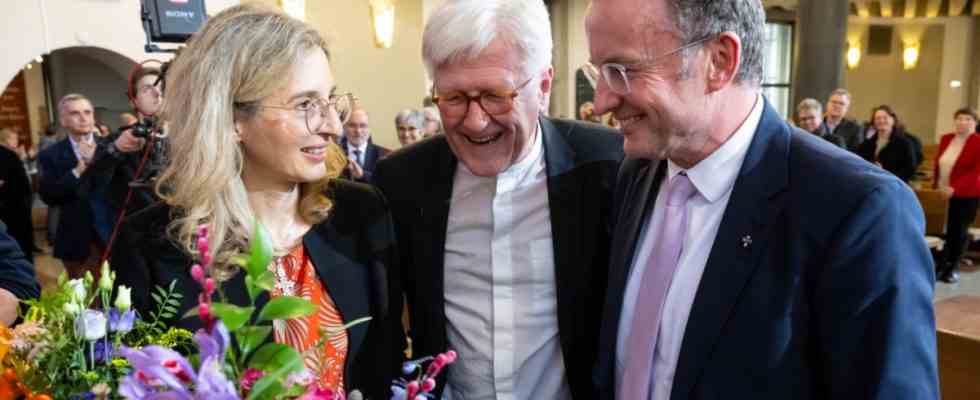In the end, the Presidium of the Bavarian Evangelical State Synod resorted to the last resort: “Come Holy Spirit, with your strength,” the members of the church parliament chanted, fervently and a little desperately. The synod was actually supposed to elect a new state bishop this Monday in the Matthäuskirche in Munich. But at the end of a long day, none of the four candidates was able to secure the necessary absolute majority of 55 votes. For the time being, there is no successor for the regional bishop Heinrich Bedford-Strohm, who is to leave in the autumn.
Bedford-Strohm was initially quite happy on Monday. He is looking forward to putting his task in new hands in the fall, he said. He had cycled through strike-plagued Munich to the Sendlinger Tor and handed out ginger candies to those sitting next to him between the ballots. But the atmosphere became more tense from ballot to ballot. Before the sixth and decisive round of voting, Bedford-Strohm was seen frowning in crisis mode, pilgrimaging back and forth between the synod presidium, the successor candidates and church lawyers.
Because if no candidate receives an absolute majority in six ballots, according to the bishop election law, a new election proposal must be submitted. Twelve years ago, Bedford-Strohm himself was only elected evangelical state bishop in the sixth ballot. But that even six ballots are not enough, “that has never happened in the history of the Bavarian state church,” said Bedford-Strohm in the evening.
There were four people to choose from: Gabriele Hoerschelmann, the director of the “One World Center” in Neuendettelsau, the Munich regional bishop Christian Kopp, 58, the Landshut dean Nina Lubomierski, 47, and the Windsbach dean Klaus Schlicker. A two-thirds majority would have been necessary in the first two ballots, from the third ballot onwards an absolute majority of 55 votes would have sufficed. The synod had a total of 108 members, two were absent with apologies.
Gabriele Hoerschelmann withdrew her candidacy after the third ballot after she was only able to get 13 and nine votes respectively. Before the fifth ballot, the 56-year-old Klaus Schlicker, Dean of Windsbach, withdrew his candidacy. Most recently, the election thriller focused on Christian Kopp and Nina Lubomierski. In the fifth ballot there was a stalemate between the two, the score was 51 to 51. Four people abstained.
These four would then have had to vote for one of the two candidates in the next vote in order to achieve the necessary 55 votes – many synod members had long doubted whether that would work. They came back from the last deliberations in a depressed mood. They turned out to be right: in the end, Kopp received 52 votes and Lubomierski 50, with four abstentions. Neither of them had the required majority.
What’s next? Hans-Peter Hübner, church lawyer from the state church office, informed the synodal members about the further procedure: One could either try to work out a new election proposal in this current synod – it lasts until Friday. The list can include the old candidates, but also new ones.
However, new candidates need the green light from the Bavarian state government, the Evangelical Church in Germany (EKD) and the United Evangelical Lutheran Church in Germany (VELKD). Getting a placement from these three places in just three days is going to be ambitious.
Alternatively, you have to choose a new date for a special date. However, the election of a new regional bishop should take place before the autumn synod scheduled for November, he explained. Because the term of office of the incumbent Bishop Heinrich Bedford-Strohm ends on October 31, 2023. On Tuesday evening, the election committee wants to discuss how to proceed now. The two candidates appeared exhausted on Monday evening: “I don’t need a crime scene anymore,” said Lubomierski. “It was a strenuous day, I have to let that sink in first,” said Kopp.
Bedford-Strohm still doesn’t want to know anything about the mood of crisis in the regional evangelical church: “We have to pull ourselves together first,” he said in the evening. “But it’s not a bad situation now, it just takes longer.” Synods are sometimes exhausting. “Nevertheless, I say: I am happy and grateful that we have free synods that can make their own voting decisions. We will know how to deal with this situation. The Holy Spirit, whom we have already invoked, will help us.”
The evening prayer that had been prepared was then cancelled, the content of which would probably no longer have really suited a regional church without a new regional bishop. But then they sang again, the synodalists, in spite of everything: “Now thank God everyone”.

